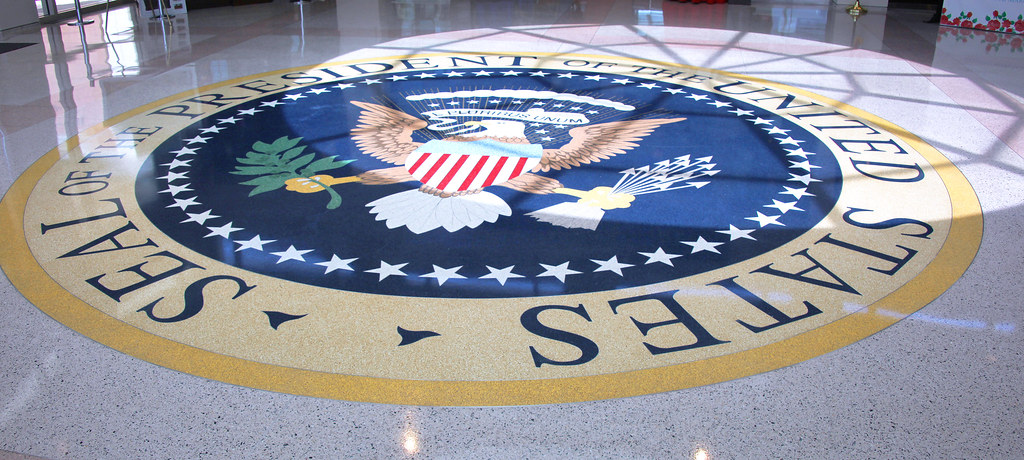Not Your Great-Grandfather’s Presidency
The job laid out by the Framers in Article II of the Constitution has expanded a mite.

After watching the two-part opener to the Democratic debate season, Dave Schuler wonders “Who’s Running for President?” He’s clear on who the declared candidates are. Rather, he think they’re running for a different office.
As defined in the Constitution the president has the following jobs:
pretty much in that order. As originally defined the president is not a prime minister, the head of his political party and, honestly, just a stand-in for it. He or she is not the domestic policy-maker-in-chief. Not the symbol of the country, its inspiration, or its collective parent. Not a monarch.
- Commander-in-chief of the military
- Foreign policy
- Managing the federal government
- Making appointments
- Signing bills enacted by the Congress into law
From the short shrift the actual jobs the president does has received you would think they’re running for some other job entirely.
He adds,
The seat of government is not the White House but the Capitol. Some would say the Rayburn Building. The most powerful person in government not the president but the Speaker of the House, closely followed by the Senate Majority Leader.
While that’s certainly the arrangement that the Framers had in mind, it hasn’t worked that way in my lifetime. Arguably, it hasn’t worked that way in living memory.
It’s no accident that the section of the Constitution dealing with the Congress, Article I, not only comes first but is by far the longest. The legislature was indeed intended to be—by far—the most powerful part of the Federal government. Indeed, the first word of the First Amendment to the Constitution was “Congress.”
But Presidential power started expanding right away.
Our first President, George Washington, declared that there were “Inherent Powers” in his office that weren’t listed in the Constitution because they were simply understood to reside with a chief executive. Our third President, Thomas Jefferson—the leader of the small government faction among the Founding generation—doubled the size of the country with the Louisiana Purchase. He fully understood that he lacked the Constitutional authority to do it but simply rationalized that it was for the good of the country.
It’s debatable at what precise moment to relationship Dave describes in his last paragraph flipped, such that the White House, not the capitol, was considered the seat of government. But if it hadn’t happened earlier, it was certainly the case during Franklin Roosevelt’s administration and has been that way ever since.
But it arguably happened well before then:
Beginning in the early 1920s, the President began to assume more prominence in setting the federal budget. The Budget and Accounting Act of 1921 gave the President overall responsibility for budget planning by requiring him to submit an annual, comprehensive budget proposal to the Congress; that act also expanded the President’s control over budgetary information by establishing the Bureau of the Budget (renamed the Office of Management and Budget in 1971). By contrast, the Congress lacked institutional capacity to establish and enforce budgetary priorities, coordinate actions on spending and revenue legislation, or develop budgetary and economic information independently of the executive branch.
This literally reverses the Constitutional process. The budget is supposed to start with the House of Representatives, work its way through the Senate, and then presented to the President as a fait accompli. But Congress voluntarily handed a major part of its responsibility to the Executive simply because the daily execution of government had gotten too vast and complex to be managed from the legislature. Congress thereby went from being the primary mover in domestic policymaking—which is to say, essentially all policymaking at the time—to an overseer of an Executive with first-mover advantage.
By the time the New Deal and World War II were in full swing two decades later, that was exponentially more true. Federalism as we’d known it was all but dead and the central government radically expanded to manage the economy and the war effort. The latter contracted temporarily; the former has continued to grow.
None of this means that Congress isn’t powerful. It has all the tools necessary to check the President and, indeed, dominate the domestic agenda. Occasionally, as it did during the immediate aftermath of Watergate and to a lesser extent in the aftermath of the 1994 midterms, Congress will assert itself. But the Speaker of the House has a far tougher job asserting her will over the legislature than the President does over the Executive.






I’m arguing that Congress should take back its power and that part of that process should be presidents who are willing to shoulder presidential responsibility.
Presidents have very little role in “growing the economy” as Bill Clinton put it or health care. As recently as the last administration President Obama and his administration did not draft the Affordable Care Act. That was, properly, left to the Congress.
Presidents have a great role, indeed as Doug pointed out in a recent comment, a nearly uncheckable role in war and foreign policy. That hasn’t changed over 230 years.
Hasn’t two decades, arguably more, of being continuously at war convinced people that we need presidents who are more concerned about foreign policy?
@Dave Schuler:
I’m with you in principle on this, Dave.
Alas, with rare exception, the American electorate doesn’t care about foreign policy. The last President we elected who had any credible foreign policy experience was George H.W. Bush and he got elected on the strength of Reagan’s economy and promptly lost to a guy who had zero experience. John McCain tried to run on foreign policy—granted, a bellicose one—against Barack Obama in 2008, arging the latter was too green to be commander-in-chief. And, indeed, he was. Few cared. By virtue of her time as Secretary of State, Hillary Clinton was prepared in that arena; she also lost.
And, like it or not, cueing up the domestic agenda has been the President’s job going back to at least FDR if not before. With the brief exception of Newt Gingrich, I can’t think of a Speaker who effectively commanded anything like a bully pulpit. Nancy Pelosi is quite effective at her job but she plays it mostly as an insider, only occasionally going public and even then doing so by playing off a hapless President.
“I’m arguing that Congress should take back its power ”
Congress has handed over most of its power to the executive branch since party, power and tribalism dominate our politics. Congress may have written Obamacare, but that is notable as an exception. We have several examples of Republicans in Congress coming up with legislation that it looks like could get support from Democrats to see the executive branch stop it dead. If the executive branch doesn’t actually write the bills, it dictates the details. Our system was set up with the idea that each branch of government would jealously guard and exert its powers. As was foreseen, now that party power dominates our system functions poorly. Congress taking back its power would be a good start, but then we also have to deal with the dysfunction within each branch of Congress also.
Steve
With great power comes great responsibility. Congress has no stomach for responsibility, they can exercise very little power, take on very little responsibility, and still collect a nice paycheck while swanning around DC like bigshots.
The Founders made a lot of good calls – they were decent anthropologists, they knew what swine people can be, and did their level best to so divide up power that we’d never have to worry about a king. Unfortunately, they overlooked the fact that 535 people will never focus on an agenda as well as one person, alone. I remember somehow being dragged into a college debate on miracles. On the miracle side, four people, including a Catholic priest. On the non-miracle side, me. There was much concern that I was outnumbered, but I just giggled contentedly – it’s so much easier to beat four than one. It ended up being the debate equivalent of the Red Wedding.
With the arrival of mass media it became impossible for the various Mitches and Nancys and Chucks to draw the attention of the camera lens, while our national propensity for assassination dictated that POTUS be followed everywhere by cameras lest we fail to get the Dallas footage we crave.
@Dave Schuler:
In theory, I am with you.
In practice, as I have repeatedly noted, party trumps institution. Our governmental system does not work as designed–and arguably never has.
I want the following, as Madison said in Fed 51, to be true: “In republican government, the legislative authority necessarily predominates.”
But, it doesn’t. And it won’t.
The Framers mucked the whole thing up when it made the president’s selection independent from the legislature (among other design missteps).
The parties dominate congress (they dominate political activity in all representative democracies globally, so this is not just a US phenomenon). “Congress” is only going to act as a truly independent entity when we have divided government that includes a filibuster-proof majority in the Senate (and the odds of that are quite slim).
Put another way: the only way to have a system in which policy-making is centered on the legislature and in which laws/legislative action have to be focal point, is to have a parliamentary system, not a presidential one.
@michael reynolds:
The first mistake you are making is talking like “Congress” is a unitary actor. It isn’t.
Beyond that, the issue is not stomach. It is a combination of incentive structures and the institutional design of the legislature.
The main incentive is re-election. That means party loyalty to a president–and hence the cross-institutional alliance between, for example, the Senate GOP and Trump.
The institutional parameters of legislating make it nearly impossible to do anything unless the start are well aligned (i.e., national consensus exists on an issue or if one party controls both chambers, which may require, depending on the action, a super-majority in the Senate).
@Steven L. Taylor:
No, I’m saying that is the problem. The many take many directions, the one can take one direction. The many divide media attention, the one attracts it. It’s Julius Caesar versus the Senate. Or I suppose the better analogy would be Augustus vs. the Senate. The many prevail when they can unite, but it’s a whole lot harder to unite a gaggle than for one man to forge a path.
@michael reynolds: While I take the basic point about the one versus the many, that is not the main problem. The main problem is that part of the many are allied with the one.
Plus we divided the many into two chamber and then empower the minority in the Senate in multiple ways.
And I understand your one v. many argument. But you can’t deny that you are still talking about “the Congress” as though it is a singular actor.
Used to be, through earmarks and a high degree if control of their party’s funding, Speakers of the House had considerable tools with which they could control the majority in Congress. The ending of earmarks may have been a Pyrrhic victory.
A democratic republic is a messy business at best. At worst, it’s inherently dysfunctional. The pressing need to “mind the store” pushes more and more power to the Executive and Judicial branches. There aren’t many limits in the Constitution to this abdication of powers. We are moving towards a Constitutional monarchy.
@dazedandconfused:
I agree with that. Eliminating earmarks was a well-intentioned error. As was eliminating the spoils system. Eliminating the spoils system ensured the triumph of the civil bureaucracy and, as we have known since bureaucracies were first studied, they are inherently corrupt.
@dazedandconfused: Removing earmarks was a massive mistake, especially in an era of polarization. It took away a means of interparty dealmaking.
There is merit to having some “I’ll scratch your back, if you’ll scratch mine” especially when things like roads and bridges back home are a needed public good.
Remember an old Disney educational film on nuclear power? In reference to the atomic bomb, the film made a simile to the old Arabic fable about the man who opens the Djinn’s bottle.
Disney was a consummate optimist. Fact is that putting the Djinn back in the bottle is just about impossible. This is true of nuclear weapons, and also of political powers. @michael reynolds is right. One person can wield and keep power more easily than a group of people. Even when Congress does assert its prerogative and drafts and passes legislation, how much of it is left to the executive branch agencies to ultimately define?
I suppose I’m one of the few that votes primarily based on foreign policy. A lot of that is the result of my being a tool for foreign policy for most of my lifetime.
Reality often doesn’t mesh with what people or campaigns want. As Dave notes in his follow-up post, foreign policy happens to Presidents whether they want it to or not. And, as we’ve seen many times, President’s, once in office, discover their grand domestic ideas die in Congress and they turn to foreign policy to create a legacy.
I wish the public cared more about foreign policy than they do, but I can understand the fact that they don’t. Foreign policy since the end of the Cold War (and probably before) has been essentially irrelevant to the bulk of the public. The majority of the public doesn’t believe they have any skin in the game.
It’s the same reason no one cares about government reform.
Surely the Senate filibuster has had a profound impact on Congress’s ability to get anything done? What is the point of working hard in the House to craft legislation if you know before you start the minority party in the Senate will prevent it going anywhere? It seems to me there are numerous dreadful flaws in the US constitution, but the filibuster is a self-imposed obstacle. Get rid of it and let the parties take responsibility for their bills, instead of wasting time in grandstanding knowing the other party will prevent you ever having to be accountable for some bill or other.
The most serious flaw in the constitution itself that I haven’t seen mentioned is the absence of a mechanism to break Congressional stalemates. In most countries, there is a provision for dismissing a dysfunctional legislature and calling fresh elections when it proves incapable of forming an effective government. The fixed terms in the US mean government could become entirely paralyzed – shut down for more than a year, perhaps – and there is nothing anyone could do apart from gritting their teeth and waiting for the next scheduled election.